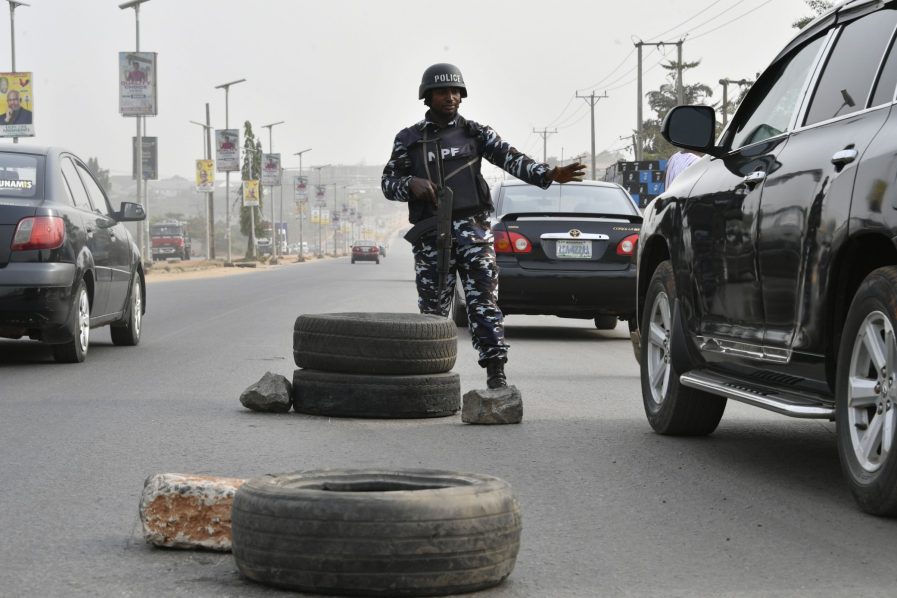
That has fed extremist views about secession for the region where a majority of people are Igbo, one of Nigeria’s three main ethnic groups along with Hausa in the north and Yoruba to the southwest.
But now, unprecedented in Nigeria’s democratic history, a surprise candidate from the southeast has a chance in the race to succeed President Muhammadu Buhari, who leaves power after two terms marked by growing insecurity and poverty. (Photo by PIUS UTOMI EKPEI / AFP)
The Defence Space Administration has urged Nigerian youths to leverage Geographic Information System (GIS) technology to support security agencies in the fight against insecurity.
Deputy Chief of Defence Space Administration, Rear Admiral Kehinde Odubanjo, made the call in Abuja at the closing ceremony of the Graduation/Business Pitching/Networking of the Digital Skills Development Program (DSDP) organised by Izoti Nigeria Limited in partnership with the Federal Ministry of Education and the World Bank.
Stressing that security is a collective responsibility, not limited to military personnel alone, Odubanjo explained that citizens can utilise GIS to provide vital information to security agencies, particularly in areas where military presence is limited.
“Security is not just for the military alone. Even the youths give information. As youths, when you are aware of GIS; [and] how to make use of space to gather information, you can also send information to the military for security purposes.
“For example, in some areas where you can’t have military presence, quickly getting information and sending it through the Internet assists us to really get the work done immediately.
“It’s just to send the location, and then action is taken. So, the youths can, as well, make use of it,” he said.
He encouraged youths to take advantage of the training, not only for personal benefits but also to contribute to national security development.
The military officer added: “I would rather expect that more youths will really take benefit of this course, not only for their own selfish purposes but for the nation, that we can develop security-wise.
“The agency sent our staff here. Some of them were trained earlier, some had not trained before coming to this course. But by the time they leave here, they will have more knowledge to impact other staff that are working in the agency.”
Chief Executive Officer of Izoti Nigeria Limited and project lead, Edidiong Amos, said digital skills will go a long way in reducing unemployment, keeping our youth active, and opening up remote job opportunities.
Noting that the programme is being implemented nationwide, she said, “By these skills that these young people have acquired, it’s going to at least go a long way to reduce unemployment, and then also keep our youth active, work-wise.
“These are skills that ordinarily they wouldn’t have been able to afford if they were to pay for it. So now, they saw an opportunity and they embraced it.
“So, this is going to open them remote job opportunities for them.”
A beneficiary of the programme, Inioluwa Toluhi, called for the inclusion of GIS education in Nigerian school curriculums.
She noted that she started with zero knowledge of GIS but now understands its applications and software.
She stated: “I started with zero per cent knowledge of GIS, but then here I am. I can understand GIS, how it works, I understand how to use GIS software, and I’m really looking forward to researching more and being able to use it and integrate it with all my other interests.
“I want to encourage that this programme should continue and that this programme should even be expanded, even included in school curriculums. Children should begin to know about GIS and geolocation services and everything that has to do with it so that it can really be a part of what Nigeria produces.”
President of the Labour Business School, Abuja, Osai Iume, stressed the importance of equipping Nigerian youth with digital skills, pointing at the nation’s increasing reliance on technology.
“Digital skills are something that Nigeria and Nigerians would have so much to benefit from. Being that we are in a digital environment as a nation, and globally, everything about life and living has now been layered on technology.
“And so, we need more of these skills, we need more of our youth to have these skills so that they can operate competitively on the global stage.”
Head of Academic Programmes, African Regional Center for Space Science, Dr. Felix Buba, said: “We are talking about digital skills, and in this age if Nigerian youth do not develop their skills digitally if they are not digitally compliant, it will be difficult for them to fit in, because most of the things that are done now in the industries, they are looking for people who are digitally savvy because most of the things are geared towards solving problems, and you have to have those skills in order to solve problems.”






